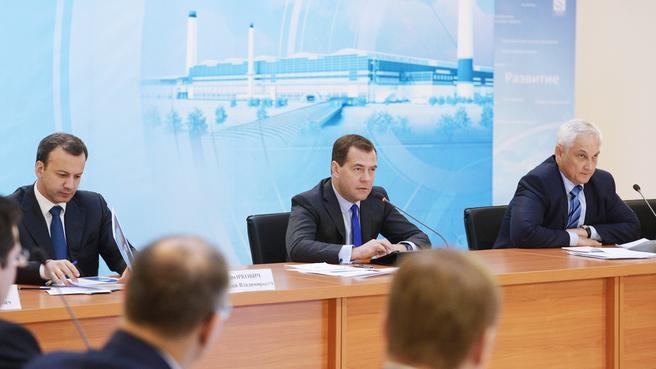Dmitry Medvedev: “Best available technology standards help improve the environment, upgrade fixed assets, create energy-efficient production capacities, solve issues related to import substitution and making our industry more competitive, and increase the number of high performance jobs.”
Dmitry Medvedev’s introductory remarks:
Good afternoon. We are meeting here today to discuss a rather serious and important area of industrial and environmental policy – transitioning to what is known as best available technology (BAT) standards. To be blunt, this process is very complicated, and maybe contradictory in some respects, but it is nevertheless indispensable for our sustainable economic development. And of course, this is not a response to what’s going on now. In other words, we are not beginning this process because of the sanctions imposed on our country and certain companies, or because of the risk that our economic development and access to critical technology will be constrained. This is something we need to do anyway.
World experience shows that best available technology standards help improve the environment significantly, upgrade fixed assets, create energy-efficient and resource-saving production capacities, solve issues related to import substitution and making our industry more competitive, and, of course, increase the number of productive jobs. Achieving these goals is within the power of our economy, our companies, but the transition to these new technological standards should be made within a short time frame, and not put off until tomorrow. In this, current circumstances perhaps play a role.
There’s a reason we are meeting here at the Seversk pipe-manufacturing plant. It is one of the oldest metallurgical enterprises in our country, established in 1739. It is a special place. It’s essentially a museum; in the past it housed blast furnaces. In recent years, a number of inefficient production facilities were closed here, and upgrades were carried out. The plant is a good example of how maintaining traditions while also introducing the best modern – and in this case, available – technology and equipment can make your business a leader.
Colleagues, our common task – I mean the state and business – is to increase the number of modern, high-tech, economically efficient and environmentally friendly enterprises in all sectors of industry, and in all parts of the country where such manufacturing facilities exist.
Dmitry Medvedev: “Our common task – I mean the government and business – is to increase the number of modern, high-tech, economically efficient and environmentally friendly enterprises in all sectors, and in all parts of the country.”
The first steps in incentivising the introduction of best available technology have already been taken. A number of presidential and government directives are being implemented. In March of this year, I approved a package of measures to shed obsolete and inefficient technology, and transition to BAT standards by introducing modern technology.
In May, the Ministry of Industry and Trade established an inter-agency council tasked with organisational and regulatory matters. In July, Federal Law No. 219 was adopted, which harmonises the process of introducing best available technology standards in our country with international legal norms. As is known, BAT is used in various countries, and was set forth in an EU directive, in the Recommendation of the OECD Council on Integrated Pollution Prevention and Control, and a number of other documents.
Dmitry Medvedev: “The first steps in incentivising the introduction of best available technology have already been taken. A number of presidential and government directives are being implemented. In March of this year, I approved a package of measures to shed obsolete and inefficient technology, and transition to BAT standards by introducing up-to-date technology.”
Today, we will discuss a number of decisions that have been prepared in this context. They are related to the publication of industrial handbooks on BAT and the procedure for identifying applicable technologies, as well as the areas of their application. Let’s hear what the relevant ministries suggest, as well as the position of the business community. We will also hear from representatives of the industrial community, because we understand that this is a challenging and, frankly, expensive task. This is not the best period for our economy, for our businesses, but nevertheless we need to move forward. We have prepared a draft government directive to approve a phased schedule for the development of industry reference books on BAT for 2015-2017. It includes a number of phases. We will hear from the Minister of Industry on this and then share our impressions.
Now let’s get down to business.
<…>












